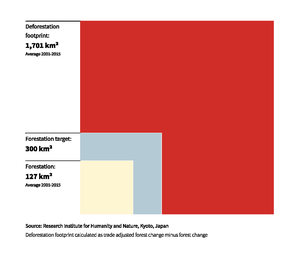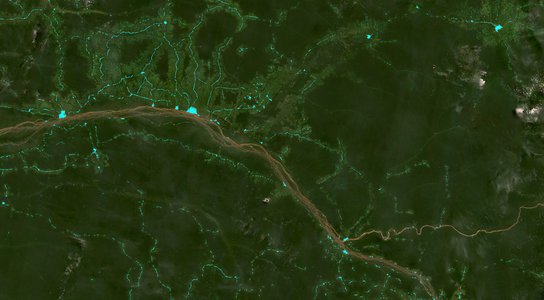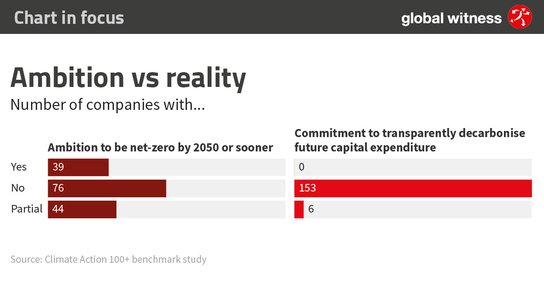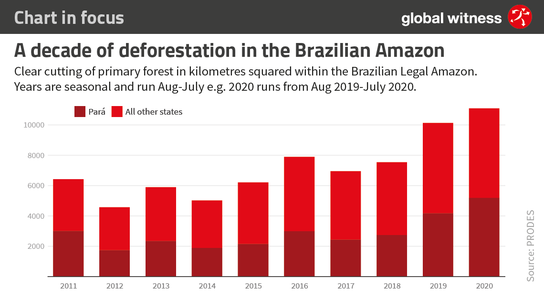Impressive-sounding domestic tree-planting rates mean very little for the climate unless we address our imported deforestation.
In May this year, George Eustice, the UK Environment Secretary, announced the England Trees Action Plan, setting out the government's ambition to boost tree-planting rates in England to support their overall target of reaching 30,000 hectares of new trees planted per year. The plan has been touted by government as a means through which they can address biodiversity loss, connect people with nature and reach net zero by 2050.
The government is right to celebrate the current plan as a step forward on the first two fronts, but the point around net zero is more controversial.
The inconvenient truth about net zero
The UK government — along with over 100 other countries — has made a pledge to become net zero by 2050. Net zero is achieved when the amount of carbon put into the atmosphere is balanced by what is taken out through carbon removal. The goal of reaching net zero by 2050 was promoted in the influential Intergovernmental Panel on Climate Change’s 2018 Special Report on 1.5°C.
Since then net zero strategies have become a popular means through which companies and governments attempt to take the action needed to limit warming to 1.5°C above pre-industrial levels. However, the concept has attracted criticism from scientists and activists given the lack of a robust definition of what constitutes net zero and the over-reliance in some plans on offsetting through unproven carbon capture technologies or problematic “nature-based solutions” such as tree planting.
A “dangerous fantasy”?
Tree planting schemes have also become an ever more important plank in the plans of companies as well as governments seeking to reach net zero targets by 2050 through offsetting emissions. While trees and the soil in which they grow do play a fundamental role in taking carbon out of the atmosphere, these "nature-based solutions" can divert attention from the urgent need to cut carbon emissions by stopping extraction and also create possible risks of human displacement and land grabbing.
For example, in Shell's “Sky 1.5” scenario, in which it sets out one possible way the global economy can become net zero by 2050, the authors suggest that an area “approaching the size of Brazil” would need to be reforested. Analysis by Carbon Brief has pointed out that this scenario sees a continued role for oil, fossil gas and coal and simply scales up radical and risky “nature-based solutions” to balance this out. As Johan Rockström and Gail Whiteman, two prominent sustainability academics, have argued, scenarios like Shell’s are a "dangerous fantasy" that both encourages long-term extraction of fossil fuels and allegedly poses new human rights risks.
In response to Carbon Brief’s analysis of the “Sky 1.5” scenario, Shell's head of scenarios, Jeremy Bentham, said:
“Sectors, such as industries that produce iron, steel, cement, plastic and chemicals and certain types of transport – the foundations of economic development – currently rely on the unique ability of hydrocarbons like oil, natural gas and coal to provide extremely high temperatures, chemical reactions or dense energy storage. Many of these cannot be electrified at all using current technology, or only at a prohibitively high cost.”
The UK’s imported deforestation footprint

Governmental tree-planting initiatives like the England Trees Action Plan should be seen in the context of a country’s global deforestation footprint. Announcements which baldly state impressive-looking domestic afforestation targets should not distract us from the fact that the UK is a net deforester on a gigantic scale once the effects of its imports and investments are considered. Any attempts to claim that the UK is making progress to net zero by tree planting must take this into account.
The UK market for commodities like soy, palm oil and cocoa — and the products that contain them — plays a significant role in deforestation outside of UK borders. Research published earlier this year in the journal Nature Ecology & Evolution shows that between 2001 and 2015, the UK was net deforester to the tune of 1,574km2: an area equivalent to the size of Greater London.
Even assuming the government meets its ambition to plant an additional 30,000 hectares (300km2) of trees a year, it would only amount to around one-fifth of the area of the UK's imported deforestation footprint.
The UK is not alone amongst rich countries in the way that it outsources much of its deforestation. The new paper shows that while each of the G7 had positive domestic afforestation rates between 2001 and 2015, after adjusting for trade, these countries had a combined net forest loss of 7,000km2 on average each year.
Not all trees absorb carbon at the same rate
Even if the UK were to redouble its efforts and plant enough new trees to balance out its imported deforestation in terms of area, it would not be a credible strategy for offsetting the environmental impacts of its consumption or emissions.
Scientists know that primary forests — ancient forests largely undisturbed by human activity — store 30–70% more carbon than plantation forests. Destruction of tropical rainforests also has irreversible and devastating impacts on biodiversity and local communities, and emits vast amounts of carbon in the process. Therefore, we cannot legitimately compensate a razed acre of primary forest in the Congo Basin with an acre of new trees in the Lake District.
Any credible plan to avert climate breakdown must therefore involve preserving the world's climate-critical rainforests which act as great carbon sinks and sequester millions of tons of man-made emissions.
The UK banks fueling global deforestation
Consumption of products containing forest-risk commodities is not the only way that rich countries support deforestation. What is often missed is the role of the financial sector in supporting many of the world's most destructive agribusinesses. Global Witness research has demonstrated how major banks headquartered in the UK bankroll companies destroying tropical forests.
In Money to Burn — which examined the financing behind six agribusinesses involved in or closely linked to deforestation in climate-critical forests — we found the UK to be the single-largest provider of international credit and investment between 2013-2019, providing $6.5 billion in financing. At the time the report was published these included large banks like HSBC, Barclays and Standard Chartered.
An opportunity to protect the world’s climate-critical forests
While domestic tree-planting plans might sound ambitious when trumpeted in the press, if they leave out the devastating impact of UK consumption and finance on tropical rainforests — some of the world's most important carbon sinks — they can't be taken seriously and don't provide a credible path to net zero.
If the government wants to tackle deforestation in the interests of the global climate, then it is vital that its legislative proposals to curb the UK's consumption of forest-risk commodities are effective and don't let finance off the hook. In this crunch year for the global climate and with the UK government hosting the crucial COP26, UK action will be essential to galvanizing international effort to tackle the destruction of tropical rainforests.


